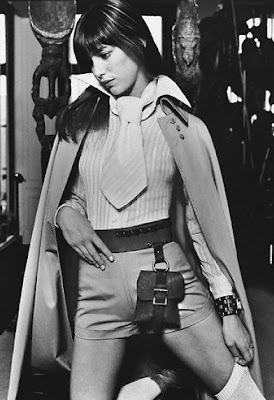
Dressing your age...
Being over 30 is fantastic and it doesn't mean you can't follow trends and be fashionable. Here are some basic tips and advice so you can keep on looking great…
Age before beauty
It's the modern fashionista's dilemma. Ever-eclectic fashion means there are fewer rules and regulations as to what we can wear, yet in an otherwise anything-goes era, age remains a strict style divider. However open-minded we are where trends are concerned, there are still prejudices about what looks good depending on how old you look.
Updated classics
There's no reason why you should replace your creative style with mumsy-wear. On reaching your thirties, you tend to choose quality over one-season high-street buys and better earning power means you can afford to splurge on classics. In the wake of logo-mania, luxury labels have become trendy, which in turn means the signature pieces of high-end brands demand cult status. The Burberry trench coat and Hermès's Birkin bag are coveted by style setters young and old. While Kate Moss works the (albeit bashed up) Birkin bag with panache, '60s actress Jane Birkin looks elegantly youthful in a fitted trench. The key to adding a quirky twist is to search for the seasonal updates. If Chanel's quilted handbag seems too grown up, consider its modern incarnation in denim or bubblegum-pink leather.
Toon time
Luckily, designers of luxury items are making things easier by including kooky details in their upmarket wares. Case in point is the Louis Vuitton link-up with artist Takashi Murakami. If an unknown label had designed these cartoon-emblazoned bags they may have been deemed far too wacky, but the heritage of Louis Vuitton makes them highly covetable. Similarly, younger designers known for their sleek style are dabbling in humorous details. Both Markus Lupfer whose grown-up garments ooze sophistication and Helmut Lang have experimented with cartoon graphics. Lang's sweatshirts have a super-sized Felix the cat motif emblazoned on the front, while Cartoon Network's Powerpuff Girls are printed in glorious technicolour on Lupfer's ladylike dresses. What's essential is quality and simplicity. While any old Felix tee might look grungy and therefore too young, the same character on an expensive fabric that's well cut is, ironically, so much more acceptable. Simple shapes let the print speak for itself, whereas a fussier outfit can look as though it's trying too hard.
Less is more
With retro-chic the toned-down approach comes into play even more. Fifties-style winkle pickers, quiffs and prom skirts are all great items, but when they are worn one at a time your own individuality is more likely to stand out. This theory is best proven in the success of Marc Jacobs. His designs are popular with customers of all ages because his version of retro-chic is mixed up so you can't easily pinpoint the references. If you do the same with your best-loved pieces, you can't help but create a unique style of your own.
Age before beauty
It's the modern fashionista's dilemma. Ever-eclectic fashion means there are fewer rules and regulations as to what we can wear, yet in an otherwise anything-goes era, age remains a strict style divider. However open-minded we are where trends are concerned, there are still prejudices about what looks good depending on how old you look.
Updated classics
There's no reason why you should replace your creative style with mumsy-wear. On reaching your thirties, you tend to choose quality over one-season high-street buys and better earning power means you can afford to splurge on classics. In the wake of logo-mania, luxury labels have become trendy, which in turn means the signature pieces of high-end brands demand cult status. The Burberry trench coat and Hermès's Birkin bag are coveted by style setters young and old. While Kate Moss works the (albeit bashed up) Birkin bag with panache, '60s actress Jane Birkin looks elegantly youthful in a fitted trench. The key to adding a quirky twist is to search for the seasonal updates. If Chanel's quilted handbag seems too grown up, consider its modern incarnation in denim or bubblegum-pink leather.
Toon time
Luckily, designers of luxury items are making things easier by including kooky details in their upmarket wares. Case in point is the Louis Vuitton link-up with artist Takashi Murakami. If an unknown label had designed these cartoon-emblazoned bags they may have been deemed far too wacky, but the heritage of Louis Vuitton makes them highly covetable. Similarly, younger designers known for their sleek style are dabbling in humorous details. Both Markus Lupfer whose grown-up garments ooze sophistication and Helmut Lang have experimented with cartoon graphics. Lang's sweatshirts have a super-sized Felix the cat motif emblazoned on the front, while Cartoon Network's Powerpuff Girls are printed in glorious technicolour on Lupfer's ladylike dresses. What's essential is quality and simplicity. While any old Felix tee might look grungy and therefore too young, the same character on an expensive fabric that's well cut is, ironically, so much more acceptable. Simple shapes let the print speak for itself, whereas a fussier outfit can look as though it's trying too hard.
Less is more
With retro-chic the toned-down approach comes into play even more. Fifties-style winkle pickers, quiffs and prom skirts are all great items, but when they are worn one at a time your own individuality is more likely to stand out. This theory is best proven in the success of Marc Jacobs. His designs are popular with customers of all ages because his version of retro-chic is mixed up so you can't easily pinpoint the references. If you do the same with your best-loved pieces, you can't help but create a unique style of your own.








.jpg)




